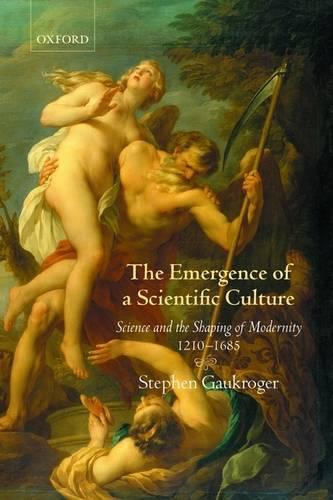Full Product Details
Author: Stephen Gaukroger (University of Sydney)
Publisher: Oxford University Press
Imprint: Oxford University Press
Dimensions:
Width: 15.50cm
, Height: 3.00cm
, Length: 23.40cm
Weight: 0.864kg
ISBN: 9780199550012
ISBN 10: 0199550018
Pages: 576
Publication Date: 23 October 2008
Audience:
Professional and scholarly
,
Professional & Vocational
,
Postgraduate, Research & Scholarly
Format: Paperback
Publisher's Status: Active
Availability: To order

Stock availability from the supplier is unknown. We will order it for you and ship this item to you once it is received by us.
Reviews
Gaukroger's book is a historical reconstruction that brackets historical context (social, practical, political etc.) and offers a plethora of studies on intellectual history on a variety of subjects that deserve attention in any investigation of the emergence of the scientific culture of the West. Wolfgang Lefevre ISIS d The thesis of his substanial and impreesive book is that Christianity indeed played a major, not, as often proposed, through the dissociation of science from religious concerns, but through a reconstituted partnership between Christianity and (a reconstructed) natural philosophy...I am not aware of any other treatment of these themes that combines so magisterially a discerning account of changing boundaries between disciplines with a dispassionate analysis of the changing relations between theology and the sciences. The result is a scholarly exploration on a grand scale. John Hedley Brooke British Journal for the History of Science Gaukroger's book is a historical context (social, practical, political, etc.) and offers a plethora of studies in intellectual history on a variety of subjects that deserve attention in any investigation of the emergence of the scientidic culture of the West. Wolfgang Lefevre ISIS This impressive and wide-ranging book is the first of a quintet devoted to the question: how in the (Western) world did all cognitive values come to be associated with scientific ones?... Gaukroger's grand beginning of an even grander five-volume narrative is an exceptional book. Its structure of scientific authority, as it were, is certain to stimulate long and lively discussions among academics of every stripe. Michael H. Shank, Renaissance Quarterly [A] substantial and impressive book...I am not aware of any other treatment of these themes that combines so magisterially a discerning account of changing boundaries between disciplines with a dispassionate analysis of the changing relations between theology and the sciences. The result is a scholarly exploration on the grand scale. John Hedley Brooke, British Journal for the History of Science
Gaukroger's book is a historical reconstruction that brackets historical context (social, practical, political etc.) and offers a plethora of studies on intellectual history on a variety of subjects that deserve attention in any investigation of the emergence of the scientific culture of the West. Wolfgang Lefevre ISIS d The thesis of his substanial and impreesive book is that Christianity indeed played a major, not, as often proposed, through the dissociation of science from religious concerns, but through a reconstituted partnership between Christianity and (a reconstructed) natural philosophy...I am not aware of any other treatment of these themes that combines so magisterially a discerning account of changing boundaries between disciplines with a dispassionate analysis of the changing relations between theology and the sciences. The result is a scholarly exploration on a grand scale. John Hedley Brooke British Journal for the History of Science Gaukroger's book is a historical context (social, practical, political, etc.) and offers a plethora of studies in intellectual history on a variety of subjects that deserve attention in any investigation of the emergence of the scientidic culture of the West. Wolfgang Lefevre ISIS This impressive and wide-ranging book is the first of a quintet devoted to the question: how in the (Western) world did all cognitive values come to be associated with scientific ones?... Gaukroger's grand beginning of an even grander five-volume narrative is an exceptional book. Its structure of scientific authority, as it were, is certain to stimulate long and lively discussions among academics of every stripe. Michael H. Shank, Renaissance Quarterly [A] substantial and impressive book...I am not aware of any other treatment of these themes that combines so magisterially a discerning account of changing boundaries between disciplines with a dispassionate analysis of the changing relations between theology and the sciences. The result is a scholarly exploration on the grand scale. John Hedley Brooke, British Journal for the History of Science
Author Information
Stephen Gaukroger has a BA (Philosophy) from the University of London and a Ph.D (History and Philosophy of Science) from the University of Cambridge. He was Research Fellow in the Philosophy of Science, Clare Hall, Cambridge, 1977-1978; Research Fellow, Department of History and Philosophy of Science, University of Melbourne, 1978-1980. Since 1981 he has been in the Philosophy Department at the University of Sydney where he is currently Professor of History of Philosophy and History of Science.



